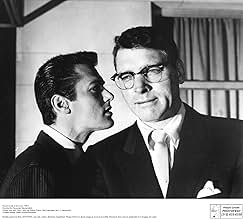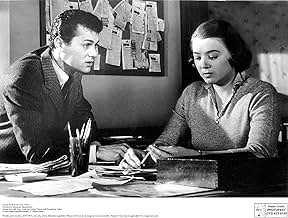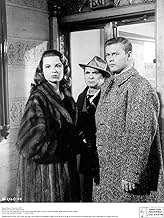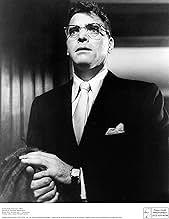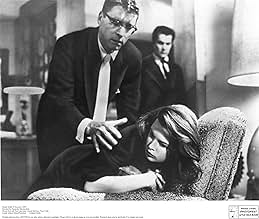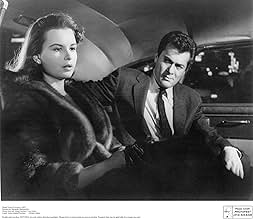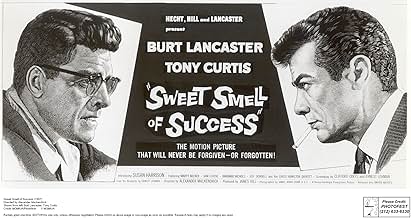IMDb-BEWERTUNG
8,0/10
38.334
IHRE BEWERTUNG
Der mächtige, aber unethische Broadway-Kolumnist J.J. Hunsecker zwingt den skrupellosen Presseagenten Sidney Falco dazu, die Romanze seiner Schwester mit einem Jazzmusiker zu beenden.Der mächtige, aber unethische Broadway-Kolumnist J.J. Hunsecker zwingt den skrupellosen Presseagenten Sidney Falco dazu, die Romanze seiner Schwester mit einem Jazzmusiker zu beenden.Der mächtige, aber unethische Broadway-Kolumnist J.J. Hunsecker zwingt den skrupellosen Presseagenten Sidney Falco dazu, die Romanze seiner Schwester mit einem Jazzmusiker zu beenden.
- Nominiert für 1 BAFTA Award
- 3 Gewinne & 3 Nominierungen insgesamt
Martin Milner
- Steve Dallas
- (as Marty Milner)
Chico Hamilton
- Self
- (as The Chico Hamilton Quintet)
Buddy Clark
- Self
- (as The Chico Hamilton Quintet)
Jay Adler
- Manny Davis
- (Nicht genannt)
Mary Bayless
- Bar Patron
- (Nicht genannt)
Nicky Blair
- Patron at Toots Shor's
- (Nicht genannt)
Nick Borgani
- Waiter
- (Nicht genannt)
Empfohlene Bewertungen
"I love this dirty town". "Match me, Sidney". "Maybe I left my sense of humour in my other suit". Great dialogue. Great script, great cinematography, great acting, great music. Christ, what do you want, blood? From the first moment we see Burt Lancaster as the impossibly sinister J.J., we know we're in for a cracking time. There he is, sitting at the restaurant table, wearing those strangely scary glasses, his face expressionless (perhaps he's smiling, just a little bit), talking to Sidney without even looking at him, firing the dialogue like bullets. When the action seeps into the New York streets, oozing menace, there's J.J. - master of all he surveys, twisting cops round his little finger, snarling and seething like some desperate animal. And there is something animal about this film: its characters writhe and twist in the lights and the shadows - demented, tortured creatures, all of them trying to maintain some semblance of normality, all of them aware, deep down, how corrupt and helpless they are. The symbols of goodness - J.J.'s sister and her boyfriend - are weak, pathetic, hopeless, unable to keep up with the neverending twists and turns of this awful labyrinth of manipulation and cruelty. Curtis and Lancaster were never better, and it's awesome to see them play such grotesque yet believable roles. How do people get like this? Where do they go from here? Perhaps it's best not to think about it, and just wallow in the brilliant nastiness of it all, before maybe going home and getting in the shower for a long, long time.
From the opening credits to the climatic ending, the scintillating dialogue and the magnetic performances from both Burt Lancaster and Tony Curtis this is Hollywood at its cerebral best. The king of the thinking mans cinema. Has better dialogue ever been written, the meetings between all the different characters that inhabit this world of shadows and intrigue, constantly draw the viewers attention to this masterpiece. When the so called film buffs compile there lists of the "best" films and so on, this should always be talked of in the top five and yet though recognised more as the years go by this is still a highly overlooked film. That Marlon Brando, De niro, Nicholson and the like should be recognised so often in said lists when Burt Lancaster in this film and in so many others has equalled or surpassed there best performances is a real scandal. Perhaps because this film strikes at the very heart of the establishment and shows the media and press up for the unscrupulous scum they are that this is one those fellows would like to forget. It is always difficult to look the truth of oneself in the mirror and this is one mirror the media should look very closely at. A masterpiece from Lancaster, who's courage never failed when making films and was always ready to tackle the kind of film making that lesser men would not have dared to, not to mention casting himself in a "bad guy" role that defied his heroic, handsome leading man status. Let us not forget that this is the same man who through out his life was never afraid to speak out on subjects that were important to him, a life long liberal and contemptuous of anyone who excepted limitation. I love this film and both Lancaster and the picture were far ahead of their time.
The main characters in "Sweet Smell Of Success" are two of the most unpleasant, unprincipled and unsympathetic people imaginable. Both are utterly corrupt and would do whatever it takes to achieve their own perverse ends.
J J Hunsecker (Burt Lancaster) is a gossip columnist who wields enormous power in New York and has the ability to make or break the careers of anyone who features in his articles. He plies his vicious trade without any concern for those whose lives he damages and frequently influences people to do his bidding by threatening to expose some unflattering or scandalous information about them. Sidney Falco (Tony Curtis) is a press agent who makes his living by providing material for Hunsecker's column. When Hunsecker becomes unhappy about a relationship that has developed between his sister and a jazz guitarist, he orders Falco to do whatever's necessary to break them up. Hunsecker racks up the pressure on Falco by not accepting any of his contributions for the column until he succeeds in his mission.
Hunsecker's power and threatening manner preclude him from having any genuine or meaningful relationships with other people. He is unconcerned about this but has an unnaturally close relationship with his sister, who on various occasions, he describes as being all that he's got.
In his efforts to get a smear about the guitarist published, Falco threatens to blackmail one columnist by telling his wife about one of his indiscretions with a cigarette girl and also provides another columnist with an inducement to print the story by getting his girlfriend to prostitute herself. He later plants marijuana in the guitarist's pocket and tips off a corrupt police officer who has the guitarist arrested.
Hunsecker thrives on the amount of power and control that he is able to use and it's ironic that he has such a hard time using his power successfully in the area of his life which is most personal and important to him.
"Sweet Smell Of Success" is expertly directed by Alexander Mackendrick and the story and it's characters are considerably more original in nature than those found in the vast majority of movies. The dialogue is impressively incisive throughout and some of the remarks made by Hunsecker are delivered with great panache. When he says "I love this dirty town", the comment exemplifies what he's all about and also highlights the source of his power. His remarks that Falco is a "cookie full of arsenic" and "lives in moral twilight" are typical quick-fire put-downs. These and his "40 faces speech" could seem pretentious and contrived if uttered by some characters but sound perfectly credible when said by Hunsecker, who is clearly very literate and well practised in coining such bitter and brutal insults. Lancaster and Curtis both contribute exceptional performances which must rank among the greatest achieved in their illustrious careers.
J J Hunsecker (Burt Lancaster) is a gossip columnist who wields enormous power in New York and has the ability to make or break the careers of anyone who features in his articles. He plies his vicious trade without any concern for those whose lives he damages and frequently influences people to do his bidding by threatening to expose some unflattering or scandalous information about them. Sidney Falco (Tony Curtis) is a press agent who makes his living by providing material for Hunsecker's column. When Hunsecker becomes unhappy about a relationship that has developed between his sister and a jazz guitarist, he orders Falco to do whatever's necessary to break them up. Hunsecker racks up the pressure on Falco by not accepting any of his contributions for the column until he succeeds in his mission.
Hunsecker's power and threatening manner preclude him from having any genuine or meaningful relationships with other people. He is unconcerned about this but has an unnaturally close relationship with his sister, who on various occasions, he describes as being all that he's got.
In his efforts to get a smear about the guitarist published, Falco threatens to blackmail one columnist by telling his wife about one of his indiscretions with a cigarette girl and also provides another columnist with an inducement to print the story by getting his girlfriend to prostitute herself. He later plants marijuana in the guitarist's pocket and tips off a corrupt police officer who has the guitarist arrested.
Hunsecker thrives on the amount of power and control that he is able to use and it's ironic that he has such a hard time using his power successfully in the area of his life which is most personal and important to him.
"Sweet Smell Of Success" is expertly directed by Alexander Mackendrick and the story and it's characters are considerably more original in nature than those found in the vast majority of movies. The dialogue is impressively incisive throughout and some of the remarks made by Hunsecker are delivered with great panache. When he says "I love this dirty town", the comment exemplifies what he's all about and also highlights the source of his power. His remarks that Falco is a "cookie full of arsenic" and "lives in moral twilight" are typical quick-fire put-downs. These and his "40 faces speech" could seem pretentious and contrived if uttered by some characters but sound perfectly credible when said by Hunsecker, who is clearly very literate and well practised in coining such bitter and brutal insults. Lancaster and Curtis both contribute exceptional performances which must rank among the greatest achieved in their illustrious careers.
10twm-2
**MILD SPOILERS** It is amazing the number of different ways a great film can weave its alluring web and pull you into its story. Of my 100 favorite films, this one's journey into that rarefied status is unique, based on but a single viewing. I saw "Sweet Smell of Success" when I was too young to really grasp the subterranean motivations of the characters who so vividly populate the film. I did not understand, for instance, why this powerful, loathsome gossip columnist, Burt Lancaster's JJ Hunsecker, who so clearly despised Tony Curtis' Sidney Falco (press agent), nonetheless tolerated his presence. There was much that I DID appreciate--the brilliant and daring acting of the two leads, the beautifully oppressive cinematography, and the scintillating dialogue--but after that single viewing, the film slowly faded from my consciousness. Twenty-five or 30 years later, I decided to make a list of my favorite movies, and came across the title of this film. Apparently, memories of seeing this production had been roiling around my unconscious all this time and now, triggered by the little blurb in the Leonard Maltin book, these half-forgotten images came bounding back into mind, now concatenated with a quarter century of life and movie-going experience. Honing my list over the next few months, and considering this film's merits, I more and more began to realize what a truly marvelous work this was. This was a study nonpareil of two creatures wholly wrapped up in themselves and their ambition, yet bound together in a mutual parasitism (the term symbiosis sounds much too nice to describe their relationship). I understood, finally, why JJ tolerated Falco's presence. He NEEDED Falco. It wasn't just that Falco would occasionally offer up tidbits that he could use in his column. It wasn't that the fawning Falco could be manipulated into performing certain . . . Uh, tasks that were too dirty for JJ to touch. No, as a ruthless power-monger, he needed the treacherous sycophant as a constant reminder and test of his superiority. Falco could be demeaned and ridiculed, but he also represented a danger, a challenge. Falco might seem a toady, but he was also a cobra waiting his chance to strike, and Hunsecker relished his role as sadistic snake charmer. Watching these two play at their oppressive games of perfidy, and dealing dirt, provide a fascinating character study perhaps the equal of the more famous examination of one Charles Foster Kane in an earlier film. There are many other characters in the movie, such as JJ's sister and her lover, and some are played with great aplomb, but they are all pawns in this disdainful dance between JJ and Falco, and it is their personalities that stay with you long after the lights come back on.
Everything about this movie seems to be nearly perfect (some have criticised the film for the relatively weak portrayal of the two hapless lovers, but a stronger emphasis on these two would only detract from the real focus--JJ and Sidney) even to the choice of names. JJ Hunsecker and Sidney Falco seem perfect monikers, by themselves conjuring up images of loathsome characters. Unfortunately, for the team that put together this masterpiece of film-noir, "Sweet Smell of Success" was no success, and critics and movie-goers alike left the theaters convinced that the "smell" generated by the film was far from sweet. Amazingly, this film not only failed to garner an Oscar, it failed to receive a single solitary nomination--not for Alexander Mackendrick's direction (this abject failure truncating his promising career), not for the incisive, endlessly quotable screenplay (Ernest Lehman & Clifford Odets), not Elmer Bernstein's wonderful score, nor the tremendous performances of Curtis and Lancaster--not even James Wong Howe's gritty cinematography, beautifully capturing the seamier side of New York City. Fortunately, history has stepped in to provide a more accurate critique of this once ignored masterpiece. I can hardly wait to see it a second time.
Everything about this movie seems to be nearly perfect (some have criticised the film for the relatively weak portrayal of the two hapless lovers, but a stronger emphasis on these two would only detract from the real focus--JJ and Sidney) even to the choice of names. JJ Hunsecker and Sidney Falco seem perfect monikers, by themselves conjuring up images of loathsome characters. Unfortunately, for the team that put together this masterpiece of film-noir, "Sweet Smell of Success" was no success, and critics and movie-goers alike left the theaters convinced that the "smell" generated by the film was far from sweet. Amazingly, this film not only failed to garner an Oscar, it failed to receive a single solitary nomination--not for Alexander Mackendrick's direction (this abject failure truncating his promising career), not for the incisive, endlessly quotable screenplay (Ernest Lehman & Clifford Odets), not Elmer Bernstein's wonderful score, nor the tremendous performances of Curtis and Lancaster--not even James Wong Howe's gritty cinematography, beautifully capturing the seamier side of New York City. Fortunately, history has stepped in to provide a more accurate critique of this once ignored masterpiece. I can hardly wait to see it a second time.
Tony Curtis learns the hard way about the "Sweet Smell of Success" in this 1957 film that stars Burt Lancaster, Sam Levene, Susan Harrison, and Barbara Nichols. In the pre-Internet days when the newspaper was king, the columnists ruled - Winchell, Ed Sullivan, Cholly Knickerbocker, Radie Harris, and let's not forget Hedda and Louella! But the King was Winchell, and while I don't think the Burt Lancaster character of J.J. Hunsecker is modeled on him, the power and control the man wielded certainly is.
Tony Curtis plays one of his best roles as Sidney Falco, a low-ranking press agent who is dependent on people like Hunsecker to mention his clients in their daily columns. But Sidney is on the outs with Hunsecker, a very bad place to be. Hunsecker has ordered Sidney to break up his sister Susan's relationship with a jazz musician, Steve (Martin Milner), and Susan is still seeing him. Sidney comes up with a plan to tear the two apart which probably would have worked, but when Steve stands up to J.J., Hunsecker is out for blood. He demands the plan be taken one step further and dangles an attractive carrot in front of Sidney to make it happen.
Done in black and white with most of the action taking place at night and often on the streets of Times Square, "The Sweet Smell of Success" has an atmosphere of slime and grit. The handsome Lancaster and Curtis are not particularly well photographed - it's not meant to be a glamorous picture. The dialogue is fast, to the point, and witty and the performances are breathtaking. Lancaster underplays the twisted Hunsecker so that his contempt for the people he writes about - and his sick attraction to his sister - can be clearly shown. He could have played it more along the lines of Curtis' Sidney - an obvious, manipulative rat - but it wouldn't have been as right as Lancaster's tightly-controlled J.J.
Curtis was born to play Sidney - an attractive, fast-talking man with no morals who plays both ends against the middle. He's a New York character, ideal for a New York guy like Curtis who grew up on the streets. Sidney is totally outrageous - he invites a cigarette girl to his apartment and then pimps her out to a columnist so he can get an item in his column; he tries blackmailing another columnist, but that backfires. It doesn't stop him from trying again.
The two victims of these piranhas are Susan and Steve, a young couple deeply in love who want to be married. Their simple story is told against a backdrop of scandal, revenge, manipulation and blackmail. Their situation makes the actions of J.J. and Sidney even seedier and more cruel than they already are.
"Sweet Smell of Success" has become a cult classic and was actually mounted at one point as a Broadway musical. Like "Nightmare Alley," it probably was too grim for audiences back then. Is anything too grim for audiences of today? Doubtful.
Tony Curtis plays one of his best roles as Sidney Falco, a low-ranking press agent who is dependent on people like Hunsecker to mention his clients in their daily columns. But Sidney is on the outs with Hunsecker, a very bad place to be. Hunsecker has ordered Sidney to break up his sister Susan's relationship with a jazz musician, Steve (Martin Milner), and Susan is still seeing him. Sidney comes up with a plan to tear the two apart which probably would have worked, but when Steve stands up to J.J., Hunsecker is out for blood. He demands the plan be taken one step further and dangles an attractive carrot in front of Sidney to make it happen.
Done in black and white with most of the action taking place at night and often on the streets of Times Square, "The Sweet Smell of Success" has an atmosphere of slime and grit. The handsome Lancaster and Curtis are not particularly well photographed - it's not meant to be a glamorous picture. The dialogue is fast, to the point, and witty and the performances are breathtaking. Lancaster underplays the twisted Hunsecker so that his contempt for the people he writes about - and his sick attraction to his sister - can be clearly shown. He could have played it more along the lines of Curtis' Sidney - an obvious, manipulative rat - but it wouldn't have been as right as Lancaster's tightly-controlled J.J.
Curtis was born to play Sidney - an attractive, fast-talking man with no morals who plays both ends against the middle. He's a New York character, ideal for a New York guy like Curtis who grew up on the streets. Sidney is totally outrageous - he invites a cigarette girl to his apartment and then pimps her out to a columnist so he can get an item in his column; he tries blackmailing another columnist, but that backfires. It doesn't stop him from trying again.
The two victims of these piranhas are Susan and Steve, a young couple deeply in love who want to be married. Their simple story is told against a backdrop of scandal, revenge, manipulation and blackmail. Their situation makes the actions of J.J. and Sidney even seedier and more cruel than they already are.
"Sweet Smell of Success" has become a cult classic and was actually mounted at one point as a Broadway musical. Like "Nightmare Alley," it probably was too grim for audiences back then. Is anything too grim for audiences of today? Doubtful.
Wusstest du schon
- WissenswertesPublicity materials for the film noted cinematographer James Wong Howe spread a film of Vaseline on Lancaster's glasses to create a shine and make his stare more menacing.
- Patzer(at around 2 mins) When Sidney peruses J.J. Hunsecker's 'The Eyes of Broadway' column on page 21 of the New York Globe newspaper, it can be seen that several of the paragraphs are repeated. Of the nine paragraphs visible, it can be seen that paragraph 7 is an exact copy of paragraph 2; 8 is a copy of 5, and 9 is a copy of 4.
- Zitate
J.J. Hunsecker: I'd hate to take a bite outta you. You're a cookie full of arsenic.
- Crazy Creditsintroducing Susan Harrison
- VerbindungenFeatured in Mackendrick: The Man Who Walked Away (1986)
Top-Auswahl
Melde dich zum Bewerten an und greife auf die Watchlist für personalisierte Empfehlungen zu.
- How long is Sweet Smell of Success?Powered by Alexa
Details
- Erscheinungsdatum
- Herkunftsland
- Sprachen
- Auch bekannt als
- La mentira maldita
- Drehorte
- Produktionsfirmen
- Weitere beteiligte Unternehmen bei IMDbPro anzeigen
Box Office
- Budget
- 3.400.000 $ (geschätzt)
- Weltweiter Bruttoertrag
- 8.025 $
- Laufzeit1 Stunde 36 Minuten
- Farbe
- Seitenverhältnis
- 1.66 : 1(original ratio)
Zu dieser Seite beitragen
Bearbeitung vorschlagen oder fehlenden Inhalt hinzufügen

Oberste Lücke
By what name was Dein Schicksal in meiner Hand (1957) officially released in India in Hindi?
Antwort

